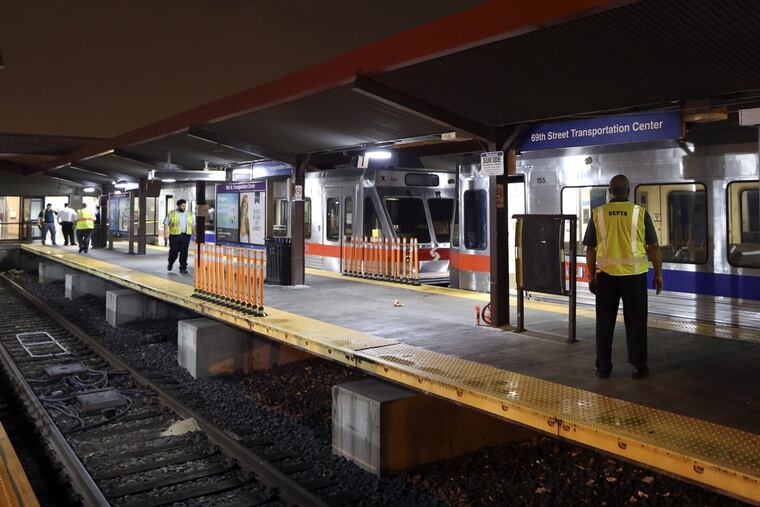Passenger says SEPTA engineer seemed 'rushed' before crash and was speeding
A passenger on the train that crashed at 69th Street Transportation Center on Tuesday has filed suit against SEPTA, and with it provided a narrative of the events leading to the collision that includes reports of excessive speed and an operator who seemed "rushed."

A passenger on the train that crashed Tuesday at 69th Street Transportation Center in Upper Darby has filed suit against SEPTA, and with it provided a narrative of the events leading to the collision that includes reports of excessive speed and an operator who seemed "rushed."
SEPTA and the National Transportation Safety Board could not confirm speed was a factor in the crash, but as of Wednesday, SEPTA had adjusted its speed restrictions on the track approaching 69th Street. The speed limit from Township Line Road to just before 69th Street had been 55 mph and was reduced to 30 mph. A signal just before 69th Street required trains to be traveling no faster than 30 mph when approaching the station; that signal has been changed to a 15-mph restriction.
"That's as a precaution and until we have a better understanding of the factors involved in the incident," said Andrew Busch, a SEPTA spokesman. "We're implementing that as a proactive safety measure."
The passenger suing SEPTA, Derrell Robbson, 26, was heading home to West Philadelphia on Tuesday after working as a cook at Rosemont College when the Norristown High Speed Line train collided with an empty train car parked at 69th Street about 12:15 a.m. Robbson suffered a concussion, according to his suit, filed in Philadelphia's Court of Common Pleas.
According to Thomas Kline, a lawyer representing him, Robbson boarded at Villanova Stadium and recalled the train overshooting the stop at Bryn Mawr. The operator left the front of the train car and went to another control area at the rear, where he reversed the train to the Bryn Mawr platform, Kline said. The suit cites media reports that the operator had also missed a stop at Gulph Mills, but that was before Robbson got on.
Eight stops after departing Bryn Mawr, the train approached 69th Street, the last stop on the route, and seemed to be going too fast, Kline said. Robbson, who had been standing throughout the trip, recalled a jerking sensation and then was knocked unconscious. Robbson awoke on the floor, gasping for air and in pain, Kline said.
Robbson was taken by ambulance to Bryn Mawr Hospital and released by Wednesday. He did not attend a news conference Wednesday conducted by Kline and other lawyers representing him.
Robbson is accusing SEPTA of being negligent and careless and is seeking compensatory damages. Citing the ongoing investigation and pending litigation, SEPTA declined to comment on Robbson's narrative.
The NTSB is investigating the crash, which led to injuries to 32 of the 42 people on board the one-car train. None of the injuries was life-threatening. The operator, who has not been identified, was among the injured but was treated at a hospital Tuesday and released.
Following the crash, SEPTA is inspecting all 26 vehicles in the High Speed Line fleet. The mean distance between failures for cars on the 13.4-mile route is about 50,000 miles, according to SEPTA route statistics.
The NTSB said it would review the possibility of mechanical failures on the train car and in the protective systems in place to slow or stop a speeding train. The automatic train control system on the Norristown High Speed Line was installed in the late 1980s and should brake a vehicle traveling too fast. It wasn't clear what role, if any, the system might have played in Tuesday's crash.
Attorney Bob Mongeluzzi, who is also representing Robbson, faulted SEPTA for not having Positive Train Control, a more-advanced control system for rail cars. PTC is federally mandated for heavy railroads such as SEPTA's Regional Rail and Amtrak, but not for light-rail systems such as the High Speed Line.
"It is high time we use that technology to protect those people who need it the most," Mongeluzzi said.
The NTSB also planned to interview the vehicle's operator. He underwent a screening for drugs and alcohol while hospitalized Tuesday, though the federal agency did not disclose the results of those tests. SEPTA policy requires drug and alcohol testing for any operator involved in an accident that results in death or serious injury. The employee would be fired immediately if there were a positive test result.
SEPTA also conducts random drug screenings. Failing a drug test leads to mandatory rehab, and a second offense means dismissal, according to SEPTA's employee guidelines.
SEPTA also maintains a program to monitor vehicle operators for sleep apnea, diabetes, hypertension, and coronary artery disease.